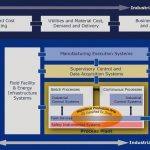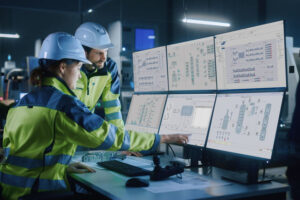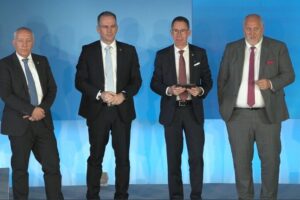We all know the buzzwords that stand for the fully digitised enterprise of tomorrow: Industry 4.0, Big Data, Industrial Internet of Things (IIoT). Ethernet is the enabling factor that will make all these developments come true. It will provide deeper insight and deliver better information for well informed decisions. Because in an Ethernet-only world, there are no language barriers anymore. Instead of translating between systems, information can flow seamlessly and free from time and location constraints. Ethernet/IP is an industrial Ethernet solution based on the Common Industrial Protocol. It uses the well-established Ethernet standard and will dramatically change both manufacturing and process industries. It fully integrates with standard Industrial Ethernet and provides the basis for a homogeneous communication infrastructure reaching from field devices distributed throughout a plant via the PCS all the way to a company’s ERP system. The chemical industry will especially benefit from this development. Ethernet/IP not only allows Ethernet to the field, thereby overcoming the inherent limitations of present fieldbus systems; it can also provide intrinsic safety to allow the connection of devices inside hazardous areas. In addition, it supports the functional safety required for many applications in chemical process plants. Moreover, with Ethernet/IP it is pos-sible to retrieve a wealth of device data to enable preventive maintenance concepts which can dramatically increase process reliability and plant availability.
Transition into the digital future
Changing a plant to Ethernet/IP communication does not require a radical cut. Instead, there are multiple migration paths to allow a gradual transition from the traditional fieldbus world to an enterprise-wide Ethernet infrastructure. This is especially important, since process plants in the chemical industry are usually long-term projects that rely on well-proven technologies in order to guarantee utmost process reliability.
Many existing plants are still using analogue field devices integrated into a digital control system via the Hart communication protocol. In the autumn of 2018, ODVA announced an enhancement to the Ethernet/IP specifications that will allow seamless integration of Hart devices into an Ethernet/IP infrastructure. ODVA is a global association made up of the world’s leading automation companies. ODVA’s mission is to advance open, interoperable information and communication technologies in industrial automation. Ethernet/IP is a network adaption of the media-independent Common Industrial Protocol (CIP).
“The integration of conventional Hart I/Os is another step in fulfilling ODVA’s vision for optimising process integration”, stated Olivier Wolff, chair of the ODVA technical working group for Ethernet/IP in the Process Industries and Global Marketing Manager Industrial Communication at Endress+Hauser. “Now that the initial focus to integrate conventional field devices with industrial control systems and asset management systems is complete, the organisation will continue to adapt Ethernet/IP to the full spectrum of process industry needs.”
Optimised process integration
The key strategy of ODVA is called Opti-mised Process Integration (OPI). The focal point of OPI is the production domain in process plants. This is where the action takes place and field devices need to be tightly integrated into the automation system. Presently, this integration is anything but trivial. For many decades, process plants relied on 4…20 mA analogue communication with field devices. Although digital fieldbuses are increasingly reaching the chemical industry, they are far from easy to implement. Remote access requires special gateways and although devices often provide large amounts of data, the practical use of such data to the ICS tends to be hindered by fieldbus limitations. The basic approach of OPI fulfils three major requirements of the global chemical industry. Convergence is achieved by the use of standard Ethernet technologies for the complete communication structure from plant to enterprise level. Compatibility is guaranteed by individual migration paths, allowing the integration of new devices that seamlessly work with the installed base. Scalability ranges from simple field devices to complex, enterprise-wide systems. The emphasis on open systems ensures interoperability while plant operators are not dependent on any specific vendor.
Evolution, not revolution
Automation systems in the chemical industry are facing the same development that the manufacturing industries experienced years ago. The trend is towards Industrial Ethernet and other open standards. Ethernet/IP incorporates standard Industrial Ethernet network interface components (NICs). By being able to use such commercial off-the-shelf hardware (COTS), plant operators not only benefit from competitive prices. They are also able to leverage the existing know-how of a broad base of engineers familiar with standard Ethernet and Internet technologies. With an Ethernet/IP infrastructure, a chemical plant is also prepared for IIoT as well as a range of totally new devices and applications. With its OPI approach, ODVA leaves the industry with the option of gradually migrating to an automation system that can access any layer in the production domain and derive detailed device and process information for improved asset management and proactive maintenance. The transition to a homogeneous and scalable Ethernet/IP infrastructure according to the OPI approach requires plant operators to address three primary use cases:
- Device-to-ICS Integration: When it comes to the integration of field devices into the ICS, the communication requirements for both existing, fieldbus-based field devices and Ethernet enabled devices need to be taken into consideration. Field devices connected via Ethernet/IP not only offer access to a wealth of instrumentation data that provide the required information for enhanced diagnostics. They also include physical layer options such as Power-over-Ethernet and conform to emerging standards for an intrinsically safe Ethernet.
- Device-to-PAM integration: Especially for the chemical industry, with its emphasis on process plants that are expected to operate for long periods of time without shutdown, field device-to-PAM integration is a vital aspect of OPI. This aspect ensures that field devices provide optimal performance at all stages of their life-cycle – from commissioning and operation to calibration and maintenance.
- Holistic field-to-enterprise communication: A holistic field-to-enterprise communication architecture is the key factor of any successful OPI strategy. It results in a paradigm shift from the classical, restrictive automation pyramid towards a flatter and more inclusive, distributed network architecture. A unified and transparent, enterprise-wide communication architecture can provide full communication between the process automation systems of individual chemical plants and the organisation’s ERP system.
The OPI approach as suggested by ODVA represents a practical migration path for the chemical industry. It paves the way from the heterogeneous communication infrastructures typical of today’s chemical process plants to the future of unified communication. This will be a future where devices and systems all speak one common language: Ethernet.
Online search: cpp0219odva
Author: Adrienne Meyer
Vice President of Operations and Membership,
ODVA









